八年级下册英语现在完成时态练习题说课材料
word完整版本2017年人教版本初中八年级下现在完成时讲及练

人教版八年级下册此刻达成时Unit8:在达成能够用来表示生在去某一刻的 ,持到在的作(用行表示)或状(be表示)常与for(+段),since(+点或去的句子)用 .①for+段Maryhasbeenillforthreedays.②since+去一个点(:自从⋯⋯以来)Ihavelivedheresince1998.③since+段+ago Ihavelivedheresincesixyearsago.since+从句(去)IhavelivedheresinceIwasborn.⑤Itis+段+since+从句(去)It’ssixyearssinceIlivedhere.瞬(buy,die,join,come ,go,leave,join ⋯⋯)不可以直接与forsince 用。
要改buy----have; borrow-----keep; come/arrive/reach/getto-----beingoout----beout;leave----beaway;begin-----beon; finish----beover;open----beopen;close-----beclosed;die----bedead取代buyMybrotherhashad( 不可以用hasbought)thisbikeforalmostfouryears.2、用keep或have取代borrowIhavekept( 不可以用haveborrowed)thebookforquiteafewdays.3、用be代替becomeHowlonghasyoursisterbeenateacher?★4、用haveacold 取代catchacold Tomhashadacoldsincethedaybeforeyesterday.5、用wear取代puton用“be+形容”表示一种状,表延性、be+married代marry2、be+ill代fall(get)ill、be+dead代die4、be+asleep代fall(get)asleep、be+awake代wake/wakeup6、be+gone代lose,die,sell,leave、be+open代open8、beclosed代close/shut、be+missing(gone,lost)代lose用“be+副”表示一种状,表延性,代止性1“be+on”代start,begin 2“be+up”代getup3“be+back(to)”代returnto,comebackto,gobackto4“behere(there)代”come(arrive,reach,get)here或go(arrive,reach,get)there 等等用“be+介短”代止性.“bein/at+地址”取代goto/cometo.用beinthearmy取代jointhearmy3.“bein/at+地址”取代movetoUNIT9hasgone(to),hasbeen(to),hasbeen(in) 的区2.Have/Hasgone(to): 去了(此刻不在说话现场)Whereisyourfather ?HehasgonetoShanghai.Have/Hasbeen(to): 去过(已不在去过的地方)MyfatherhasbeentoShanghai.Have/hasbeenin :呆了多久(还在所呆的地方)MyfatherhasbeeninShanghai fortwomonths ./sincetwomonthsago.此刻达成时解说一.基本构造:助动词have/has+过去分词(done)二.基本句型:否认句:主语+have/has+not+ 过去分词+其余.一般疑问句:Have/Has+主语+过去分词+其余.简单答语:Yes,主语+have/has.(一定) No,主语+haven't/hasn't.(否认)三.此刻达成时的标记此刻达成时的含义之一是过去达成的动作对此刻仍有影响,用以下四大标记词能够表达这类含义:*以already,just 和yet为标记Hehasalreadygotherhelp. 他已获得她的帮助。
人教版八年级英语下册Unit 10 现在完成时精讲精练

八下unit 10 现在完成时精讲精练表示从过去已经开始持续到现在的动作或状态,可以和表示“从过去某一时刻延续到现在的一段时间状语”连用,如“for + 时间段”、“since + 过去时间点”、“since + 过去时的从句”、“since + 一段时间+ ago”。
且for与since引导的时间状语可以相互转换。
一、含since 或for 的现在完成时某些动词的现在完成时可表示过去某一时间开始并一直持续到现在的动作或状态,常与“for + 时间段”、“ since+过去的时间点或从句”或“since + 时间段+ago”连用。
He has worked here for over twenty years.He has learned about 5,000 English words since he went to college.She’s been at this school since five years ago.二、现在完成时中的谓语动词在现在完成时中,与“for + 时间段”、“since + 过去的时间点或从句”或“since+时间段+ago”连用的动词必须为延续性动词。
常见的延续性动词有have,live,teach,learn,work,study ,know 等;常见的非延续性动词(词组)有come,go,leave,start,die,finish,become,join,buy,get married 等。
1. 转换为相应的延续性动词,用于现在完成时。
borrow — keep buy — have put on — wearcatch a cold — have a cold get to know — knowget to sleep — sleep2. 转化为“be + 形容词/副词/介词/名词”begin / start — be on go out — be out close — be closedopen — be open get to/arrive/reach — be (in)die — be dead leave — be away finish — be overfall sleep — be asleep join — be in/be a member ofbecome — be make friends — be friendscome/go — be + 相应的介词短语达标检测一.单项选择。
人教版英语八年级下册 Unit 9 现在完成时讲解及练习
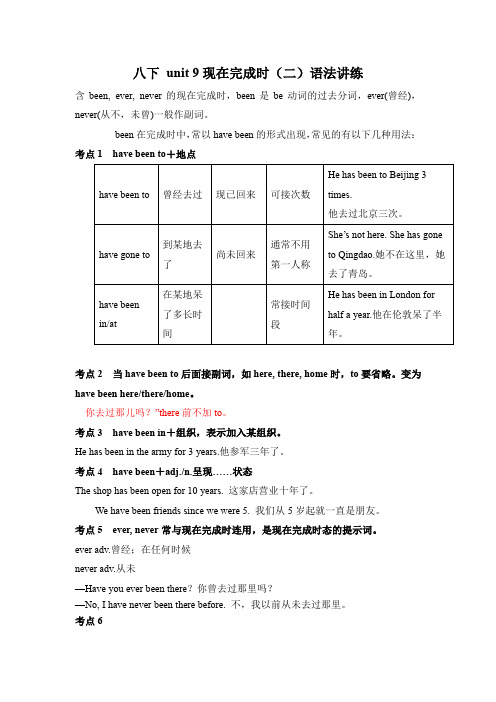
八下unit 9现在完成时(二)语法讲练含been, ever, never的现在完成时,been是be动词的过去分词,ever(曾经),never(从不,未曾)一般作副词。
been在完成时中,常以have been的形式出现,常见的有以下几种用法:考点1 have been to+地点考点2 当have been to后面接副词,如here, there, home时,to要省略。
变为have been here/there/home。
你去过那儿吗?”there前不加to。
考点3 have been in+组织,表示加入某组织。
He has been in the army for 3 years.他参军三年了。
考点4 have been+adj./n.呈现……状态The shop has been open for 10 years. 这家店营业十年了。
We have been friends since we were 5. 我们从5岁起就一直是朋友。
考点5 ever, never常与现在完成时连用,是现在完成时态的提示词。
ever adv.曾经;在任何时候never adv.从未—Have you ever been there?你曾去过那里吗?—No, I have never been there before. 不,我以前从未去过那里。
考点6表示过去已经开始,持续到现在的动作或状态。
此时常与“for+一段时间”或“since+过去的点时间或从句(从句用一般过去时)”以及so far(到目前为止)等时间状语连用。
I’ve lived here since 2000.自从2000年我就住在这里。
=I’ve lived here since 13 years ago.=I’ve lived here for 13 years.=It is 13 years since I began to live here.注意:①在这类句子的肯定句和疑问句中谓语动词必须用延续性动词。
八年级英语下册 现在完成时专练与讲解 人教新目标版

现在完成时专练一、现在完成时概念:1.表示过去发生或已经完成的动作对现在造成的影响或结果.2.表示过去已经开始,一直延续到现在的动作或状态。
结构:have/has + 过去分词(当主语是第三人称单数时用has,其余人称用have。
过去分词:规则动词的过去分词构成与动词过去式相同;不规则动词需要特殊记忆。
) 否定式: 主语 + haven't/hasn't + 过去分词 + 其他。
疑问式: Have /Has + 主语 + 过去分词 + 其他?简略答语: Yes, 主语+ have/has.(肯定)No, 主语+ haven't/hasn't.(否定)用have, has填空:1.I _______ told him the news.2.She ________ come back from school.3.You ________ won the game.4.They have bought a computer.(改成否定句)5.He has lost his book.(先改成一般疑问句,再作肯定与否定回答)二、现在完成时的含义之一是过去完成的动作对现在仍有影响.例如:I have just cleaned my clothes. 我刚洗过衣服。
(“洗衣服”是发生在过去的动作,对现在造成的结果是“衣服干净了”) 2.I have just finished my work.(我刚做完工作。
) 3.I haven’t finished the work yet.(我还没有做完工作。
) 4.Has Bob had his lunch yet? (鲍布已经吃过中饭了吗?)现在完成时常用的时间状语有:(用于第一种概念)already(”已经”用于肯定句的中间和末尾处);never (“从不”用于中间处); ever(”曾经”用于疑问句和肯定句的中间处);just(“刚刚”用于中间处); yet (“已经”用于疑问句的末尾处 / “还”用于否定句的末尾处)或不加任何的时间状语,但不能和表示过去的时间状语连用.(1)already, just和yet: already, just和yet 表示到现在为止动作或状态已经、刚刚或还没有发生。
牛津译林版英语八下_Units 1-3 现在完成时语法讲解和练习
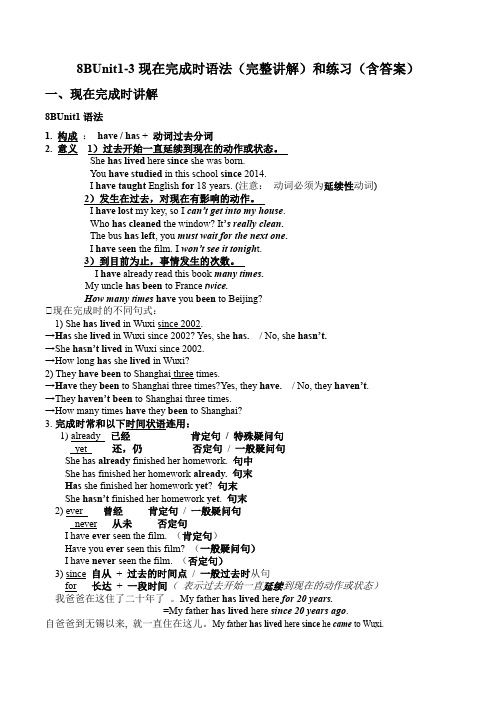
8BUnit1-3现在完成时语法(完整讲解)和练习(含答案)一、现在完成时讲解8BUnit1语法1. 构成:have / has + 动词过去分词2. 意义1)过去开始一直延续到现在的动作或状态。
She has lived here since she was born.You have studied in this school since 2014.I have taught English for 18 years. (注意:动词必须为延续性动词)2)发生在过去,对现在有影响的动作。
I have lost my key, so I can’t get into my house.Who has cleaned the window? It’s really clean.The bus has left, you must wait for the next one.I have seen the film. I won’t see it tonigh t.3)到目前为止,事情发生的次数。
I have already read this book many times.My uncle has been to France twice.How many times have you been to Beijing?★现在完成时的不同句式:1) She has lived in Wuxi since 2002.→Has she lived in Wuxi since 2002? Yes, she has./ No, she hasn’t.→She hasn’t lived in Wuxi since 2002.→How long has she lived in Wuxi?2) They have been to Shanghai three times.→Have they been to Shanghai three times?Yes, they have./ No, they haven’t.→They haven’t been to Shanghai three times.→How many times have they been to Shanghai?3.完成时常和以下时间状语连用:1)already 已经肯定句/ 特殊疑问句yet 还,仍否定句/ 一般疑问句She has already finished her homework. 句中She has finished her homework already.句末Has she finished her homework yet? 句末She hasn’t finished her homework yet. 句末2) ever 曾经肯定句/ 一般疑问句never 从未否定句I have ever seen the film. (肯定句)Have you ever seen this film? (一般疑问句)I have never seen the film. (否定句)3) since 自从+ 过去的时间点/ 一般过去时从句for 长达+ 一段时间(表示过去开始一直延续到现在的动作或状态)我爸爸在这住了二十年了。
译林版英语八年级下册第一单元现在完成时讲解及练习
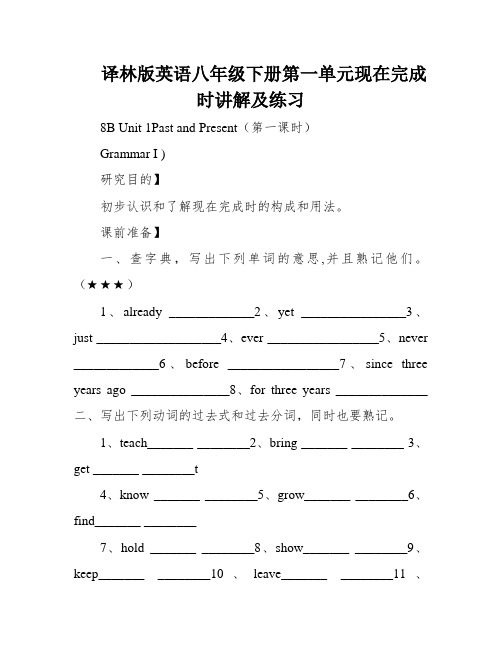
译林版英语八年级下册第一单元现在完成时讲解及练习8B Unit 1Past and Present(第一课时)Grammar I )研究目的】初步认识和了解现在完成时的构成和用法。
课前准备】一、查字典,写出下列单词的意思,并且熟记他们。
(★★★)1、already _____________2、yet ________________3、just ___________________4、ever _________________5、never _____________6、before _________________7、since three years ago _______________8、for three years ______________二、写出下列动词的过去式和过去分词,同时也要熟记。
1、teach_______ ________2、bring _______ ________3、get _______ ________t4、know _______ ________5、grow_______ ________6、find_______ ________7、hold _______ ________8、show_______ ________9、keep_______ ________10、leave_______ ________11、lose_______ ________12、run_______ ________13、swim_______ ________14、drive_______ ________ 15、begin_______ ________三、尝试着阅读下面的知识链接,看看是否可以理解。
知识链接】现在完成时的“完成用法”和“未完成用法”一、现在完成时的结构:助动词have / has +动词的过去分词( Past Participle )其中have / has为助动词,因而它的否定和疑问句形式全部由have / has进行变化。
人教版新目标英语八年级下册《现在完成时复习SectionAGrammar》说课稿3

人教版新目标英语八年级下册《现在完成时复习 Section A Grammar 》说课稿3一. 教材分析人教版新目标英语八年级下册《现在完成时复习 Section A Grammar 》是一篇关于现在完成时的复习文章。
文章通过生动的例句和练习,帮助学生理解和掌握现在完成时的用法。
本节课的主要内容包括现在完成时的结构、标志词、时间状语以及现在完成时与一般过去时的区别。
教材内容丰富,难度适中,适合进行复习和巩固。
二. 学情分析在进入八年级下册的学习之前,学生们已经学习了英语的一般现在时、一般过去时和一般将来时。
他们对于时态的概念和用法有一定的了解,但可能在现在完成时的用法上还存在一些困惑。
因此,在教学过程中,需要关注学生的学习需求,针对性地进行讲解和辅导。
三. 说教学目标1.知识目标:通过本节课的学习,使学生掌握现在完成时的结构、标志词、时间状语以及现在完成时与一般过去时的区别。
2.能力目标:培养学生运用现在完成时进行交流的能力,提高学生的英语表达能力。
3.情感目标:激发学生学习英语的兴趣,培养学生的自信心和自主学习能力。
四. 说教学重难点1.重点:现在完成时的结构、标志词、时间状语以及现在完成时与一般过去时的区别。
2.难点:现在完成时的运用和与一般过去时的区分。
五. 说教学方法与手段1.采用任务型教学法,通过小组讨论、角色扮演等活动,激发学生的学习兴趣,提高学生的参与度。
2.使用多媒体教学手段,如PPT、视频等,直观地展示现在完成时的用法,帮助学生更好地理解和掌握。
3.利用例句和练习,进行讲解和辅导,让学生在实践中学会运用现在完成时。
六. 说教学过程1.导入:通过一个简单的互动游戏,引导学生回顾一般过去时的用法,为新课的学习做好铺垫。
2.讲解:讲解现在完成时的结构、标志词、时间状语以及现在完成时与一般过去时的区别。
通过生动的例句和练习,帮助学生理解和掌握。
3.实践:学生进行小组讨论,用现在完成时进行交流,教师巡回指导并进行点评。
新目标英语八年级下-现在完成时的教案及练习

现在完成时态--练习资料我们先来翻译几个句子:1 您已经问过这个问题两遍了,别再烦我了。
2我能借您得字典用一下吗?对不起,已经借给tom了。
3 您以前见过她吗?不,从来没有过。
4 您曾经去过北京吗?就是得我去过那儿三次。
5 您已经瞧完那本小说了吗?就是得,我已经把它还给图书馆了。
*基本定义:现在完成时有两种用法1、过去发生得某一动作对现在造成得影响或结果或到现在为止已经发生或完成得动作。
2、表示过去发生得、持续到现在得动作或状态。
句型转换1、 I have been to Macau before、 (改为否定句)I _________ _________ been to Macau before2、 Li Ming has already finished his homework、(改为一般疑问句并做肯定与否定回答)_____________ Li Ming _____________ finished his homework yet?3、They have been here since 2000、 (对划线部分提问)have they been here?*句型构成:基本结构:主语+have/has+动词得过去分词(p、p)①肯定句:主语+have/has+动词得过去分词(p、p)(V-ed)+宾语(或者其她)、②否定句:主语+have not/has not+动词得过去分词(p、p)(V-ed)+宾语、③一般疑问句:Have/Has+主语+动词得过去分词(p、p)(V-ed)+宾语(或者其她)?④特殊疑问句:特殊疑问词+一般疑问句(have/has+主语+过去分词+其她将一般过去时得句子改写为现在完成时得句子。
1、 My father bought many books for me yesterday 、Now , I have a lot to read because ________________________________2、 I saw this film last week、Now, I know this film because I_____________________、3、 I did my homework yesterday、Now, I can give it to the teacher because I______________用法一*一表过去发生得某一动作对现在造成得影响或结果,(强调结果现在还存在)例如I have just cleaned my clothes、我刚洗过衣服。
新目标英语八年级下-现在完成时的教案及练习

现在完成时态--练习资料结构:助动词have/has + 过去分词句型转换:否定句:一般疑问句:特殊疑问句:一、表过去发生的某一动作对现在造成的影响或结果,(强调结果现在还存在)例如I have just cleaned my clothes. 我刚洗过衣服。
(“洗衣服”是发生在过去的动作,对现在造成的结果是“衣服干净了”)I have just had my breakfast. (对现在的影响:不饿)Has he had his breakfast? Yes, he has.将一般过去时的句子改写为现在完成时的句子。
1. My father bought many books for me yesterday .Now , I have a lot to read because ________________________________2. I saw this film last week.Now, I know this film because I_____________________.3. I did my homework yesterday.Now, I can give it to the teacher because I______________二、通常与表示包括现在在内的时间副词just (谓语动词之前) (刚刚),already(已经(肯定句) ), before(之前), yet(一般疑问(句末),已经;否定句:还)never(从不), ever (疑问句) twice(两次),recently(近来)等状语连用,可以和瞬间动词和持续性动词连用,1 Tom has a lready finished his homework.Tom hasn’t finished his homework yet.2 I have just had my lunch.She hasn’t seen you b efor e.3 Have you e ver eaten fish?I have never eaten fish三、体会时间状语:①I have never heard of that before.②Have you ever ridden a horse?③She has already finished the work.④Have you milked the cow yet?Yes, I have done that already.⑤I’ve just finished my homework.⑥He has not come yet.四、请先圈出时间状语,再用词的适当形式填空1. I ________(have) lunch already.2. the train_______ (arrive) yet?3.Tom ____ never_______ (be ) to China.4. The twin ______just _____(see) my father.5. The twins ____(see) my father just now.6.______ you ever _______(ride) a horse? Never.7._____ you ________(clean) the room?Yes, we__________(do) that already.When _______ you ______(do) it?We _______(do) it an hour ago.8._____ he ______(see) this film yet? No.When _____ he _____(see) it?He ______ it tomorrow.9. How many times _____you______(come) here?Once.五、翻译句子:1 你已经问过这个问题两边了,别再烦我了。
(word完整版)八年级英语下册-现在完成时讲解和练习试题-人教新目标版.doc
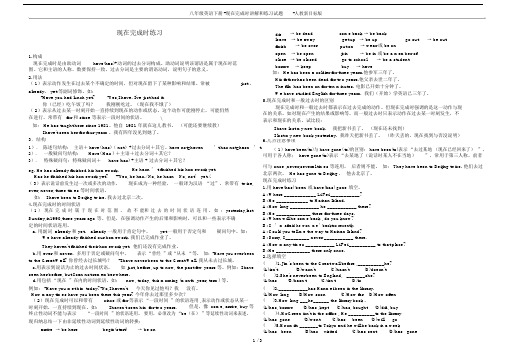
八年级英语下册 -现在完成时讲解和练习试题-人教新目标版现在完成时练习die → be dead come back → be backgo out → be outleave → be away get up → be upfinish → be over put on → wear 或 be on1.构成open → be open join → be in 或 be a member of close → be closed go to school → be a student现在完成时是由助动词have(has)+动词的过去分词构成。
助动词说明该谓语是属于现在时范borrow → keep buy → have围。
它和主语的人称、数要保持一致。
过去分词是主要的谓语动词,说明句子的意义。
如: He has been a soldier for three years.他参军三年了。
2.用法His father has been dead for two years.他父亲去世二年了。
( 1)表示动作发生在过去某个不确定的时间,但对现在留下了某种影响和结果。
常被just 、The film has been on for ten minutes. 电影已开始十分钟了。
already、 yet 等副词修饰。
如:We have studied English for three years. 我们(开始)学英语已三年了。
-Have you had lunch yet? -Yes,I have. I've just had it. 5.现在完成时和一般过去时的区别你(已经)吃午饭了吗?我刚刚吃过。
(现在我不饿了)现在完成时和一般过去时都表示在过去完成的动作。
但现在完成时强调的是这一动作与现( 2)表示从过去某一时刻开始一直持续到现在的动作或状态。
这个动作可能刚停止,可能仍然在的关系。
如对现在产生的结果或影响等,而一般过去时只表示动作在过去某一时刻发生,不在进行。
八年级下英语现在完成时讲解及练习(4页)

现在完成时一、现在完成时态的结构have /has (助动词)+done(过去分词)说明:动词的过去分词有规则形式和非规则形式两种,非规则分类:AAA、ABB、ABA、ABCAAA cost-cost-cost,hit-hit-hit,let-let-let,ABB buy-bought-bought,catch-caught-caught,ABA come-came-come,become-became-become ,run-ran-runABC break-broke-broken,fly-flew-flown,ride-rode-ridden ,take-took-taken,二、现在完成时态的基本句式肯定句:主语+have/has+Vpp+其他》否定句:在助动词have/has后加上否定词not一般疑问句:将助动词have或has提到句首,肯定的简略回答是:Yes,主语+have/has. 否定的简略回答是:No,主语+have/has not.特殊疑问句:特殊疑问词+一般疑问句三、现在完成时态的用法2、表示过去已经开始,持续到现在的动作或状态,可以和表示从过去某一时刻延续到现在(包括“现在”在内)的一段时间的状语连用,如for+时间段、since+过去的时间点、疑问词how long等。
例如:注意:此种用法中表示持续动作或状态的动词必须是延续性动词(否定句除外)。
例如:(1)这本书我已经买了三个月了。
错误:I have bought the book for three months.|正确:I have had the book for three months.(2)你哥哥参军多长时间了错误:How long has your brother joined the army正确:How long has your brother been in the army/been a soldier四、现在完成时态与一般过去时态的区别3)现在完成时可表示持续到现在的动作或状态,动词一般是延续性的,如live, teach, learn, work, study, know.She joined the League three years ago. (加入的动作不是延续的)She has been in the League for three years (since three years ago). (在团内的状态可延续)She has been a League member for three years (since three years ago).是团员的状态可持续)?比较have/has been to、have/has gone to 和have been inhave(has) been 表示“曾去过某地,已经从那里回来了”,可以和ever、never、twice等连用。
人教版八年级英语下册现在完成时讲解及练习
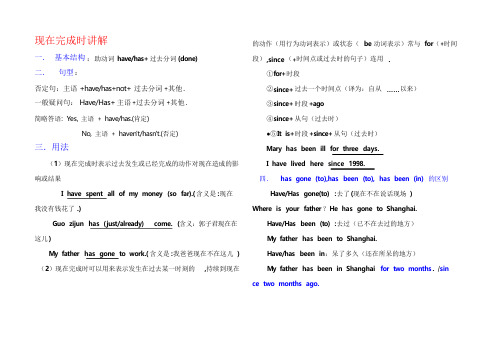
现在完成时讲解一.基本结构:助动词have/has+过去分词(done)二.句型:否定句:主语+have/has+not+过去分词+其他.一般疑问句:Have/Has+主语+过去分词+其他.简略答语:Yes,主语+have/has.(肯定)No,主语+haven't/hasn't.(否定)三.用法(1)现在完成时表示过去发生或已经完成的动作对现在造成的影响或结果I have spent all of my money(so far).(含义是:现在我没有钱花了.)Guo zijun has(just/already)come.(含义:郭子君现在在这儿)My father has gone to work.(含义是:我爸爸现在不在这儿)(2)现在完成时可以用来表示发生在过去某一时刻的,持续到现在的动作(用行为动词表示)或状态(be动词表示)常与for(+时间段),since(+时间点或过去时的句子)连用.①f or+时段②s ince+过去一个时间点(译为:自从……以来)③s ince+时段+ago④s ince+从句(过去时)●⑤I t is+时段+since+从句(过去时)Mary has been ill for three days.I have lived here since1998.四.has gone(to),has been(to),has been(in)的区别Have/Has gone(to):去了(现在不在说话现场)Where is your father?H e has gone to Shanghai.Have/Has been(to):去过(已不在去过的地方)My father has been to Shanghai.Have/has been in:呆了多久(还在所呆的地方)My father has been in Shanghai for two months./sin ce two months ago.五.现在完成时的标志1.现在完成时的含义之一是过去完成的动作对现在仍有影响,用以下四大标志词可以表达这种含义:*以already,just和yet为标志He has already got her help.他已得到她的帮助。
2022-2023学年人教版八年级下学期英语时态专讲--现在完成时讲义+习题
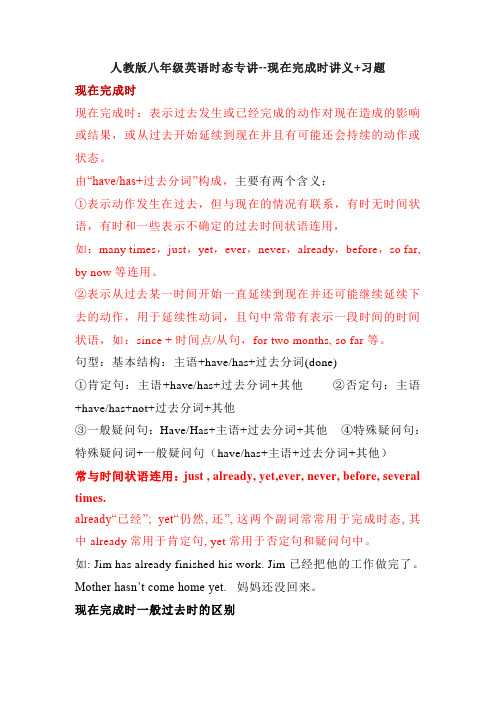
人教版八年级英语时态专讲--现在完成时讲义+习题现在完成时现在完成时:表示过去发生或已经完成的动作对现在造成的影响或结果,或从过去开始延续到现在并且有可能还会持续的动作或状态。
由“have/has+过去分词”构成,主要有两个含义:①表示动作发生在过去,但与现在的情况有联系,有时无时间状语,有时和一些表示不确定的过去时间状语连用,如:many times,just,yet,ever,never,already,before,so far, by now等连用。
②表示从过去某一时间开始一直延续到现在并还可能继续延续下去的动作,用于延续性动词,且句中常带有表示一段时间的时间状语,如:since + 时间点/从句,for two months, so far等。
句型:基本结构:主语+have/has+过去分词(done)①肯定句:主语+have/has+过去分词+其他②否定句:主语+have/has+not+过去分词+其他③一般疑问句:Have/Has+主语+过去分词+其他④特殊疑问句:特殊疑问词+一般疑问句(have/has+主语+过去分词+其他)常与时间状语连用:just , already, yet,ever, never, before, several times.already“已经”; yet“仍然, 还”,这两个副词常常用于完成时态, 其中already常用于肯定句, yet常用于否定句和疑问句中。
如: Jim has already finished his work. Jim已经把他的工作做完了。
Mother hasn’t come home yet. 妈妈还没回来。
现在完成时一般过去时的区别现在完成时表示的是与现在有关联的过去事件;而一般过去时则与现在毫无关系,只是单纯的过去的情况。
比较:I have lost my pen, so I have to buy one.我丢了钢笔,所以得去买一枝。
人教版八年级下册英语Unit8——10单元现在完成时讲解和练习(无答案)
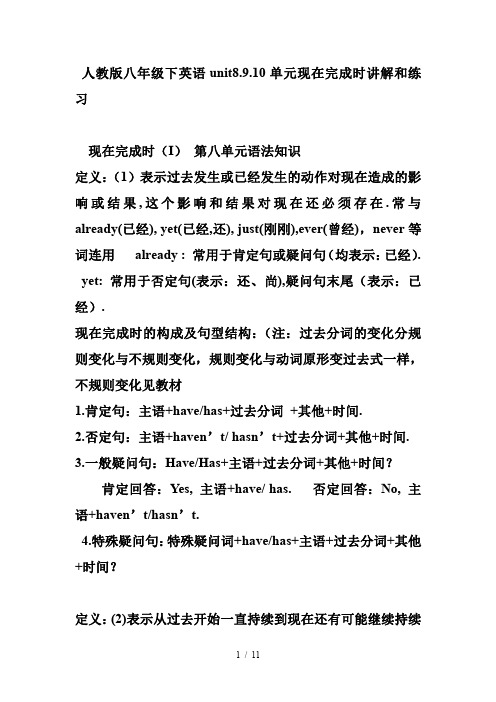
人教版八年级下英语unit8.9.10单元现在完成时讲解和练习现在完成时(I)第八单元语法知识定义:(1)表示过去发生或已经发生的动作对现在造成的影响或结果,这个影响和结果对现在还必须存在.常与already(已经),yet(已经,还),just(刚刚),ever(曾经),never等词连用already:常用于肯定句或疑问句(均表示:已经). yet:常用于否定句(表示:还、尚),疑问句末尾(表示:已经).现在完成时的构成及句型结构:(注:过去分词的变化分规则变化与不规则变化,规则变化与动词原形变过去式一样,不规则变化见教材1.肯定句:主语+have/has+过去分词+其他+时间.2.否定句:主语+haven’t/hasn’t+过去分词+其他+时间.3.一般疑问句:Have/Has+主语+过去分词+其他+时间?肯定回答:Yes,主语+have/has.否定回答:No,主语+haven’t/hasn’t.4.特殊疑问句:特殊疑问词+have/has+主语+过去分词+其他+时间?定义:(2)表示从过去开始一直持续到现在还有可能继续持续下去的动作或状态。
(3)现在完成时与一般过去时的区别:现在完成时属于现在时态的范围,不能和表示过去的时间状语连用,如yesterday,last night,three weeks ago,in2019等.一般过去时只表示过去的动作或状态,和现在不发生关系。
一般过去时可以和表示过去的时间状语连用.例题:1._____you________(clean)the room?Yes, we__________(do)that already.2.When_______you______(do)it?We _______(do)it an hour ago.3.______he______(see)this film yet?Yes, ______________4.When_____he_____(see)it?He______it last week.5.I_______(read)the novel twice.It’s interesting.6.Mr.Chen_________(give)up smoking last year.7----.She_____(go)to Pairs,hasn’t she?---Yes,_______How____she____(go)there?She____(go) there by air.现在完成时(II)第九单元语法知识1.构成:含有be动词的现在完成时的谓语部分由“have/has+been+to+地点”构成,表示:曾经去过某地…(been是be的过去分词,不规则变化)2.基本句型:(1)肯定句:主语+have/has+been+to+地点.(2)否定句:主语+haven’t/hasn’t+been+to+地点.(3)一般疑问句:Have/Has+主语+been+to+地点?肯定回答:Yes,主语+have/has.否定回答:主语+haven’t/hasn’t.(4)特殊疑问句:特殊疑问词+have/has+主语+been?eg:Where have you been?3.用法:用来表示之前已经发生和完成度的动作与状态,其结果却和现在有联系.动作和结果发生在过去,但它的影响现在还在.可以和never,ever,once,twice,three/four…times等副词连用.eg:They have been to Chongqing twice.I have never been to Sichuan.Has she ever been to Hainan?3.区别:(1).have/has been to+地点表示:曾经去过某地,已经回来了(2).have/has gone to+地点表示:去了某地,还没有回来eg:She has been to Shanghai.(她去过上海,已经回来了)She has gone to Shanghai.(她去了上海,还没有回来)(3).have been in表示“在某地呆了多少时间”,常与时间段状语连用eg:I have been in Shanghai for three years.我到上海已有三年了。
人教版八年级英语下册现在完成时态讲解和练习
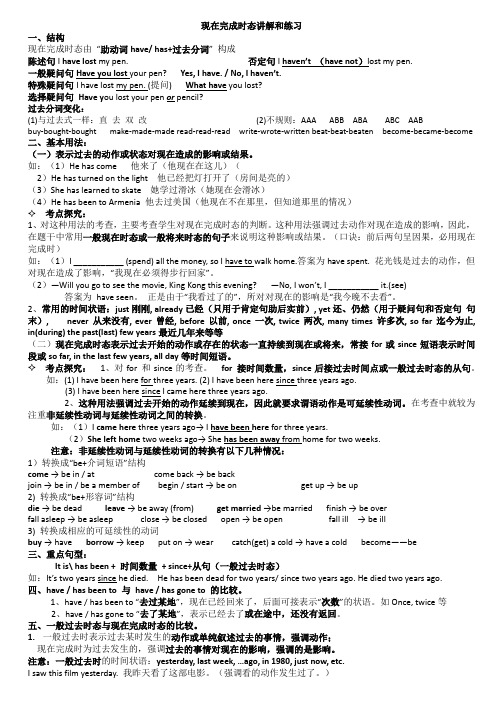
现在完成时态讲解和练习一、结构现在完成时态由“助动词have/ has+过去分词” 构成陈述句I have lost my pen.否定句I haven’t (have not)lost my pen.一般疑问句Have you lost your pen? Yes, I have. / No, I haven’t.特殊疑问句I have lost my pen. (提问) What have you lost?选择疑问句Have y ou lost your pen or pencil?过去分词变化:(1)与过去式一样:直去双改(2)不规则:AAA ABB ABA ABC AABbuy-bought-bought make-made-made read-read-read write-wrote-written beat-beat-beaten become-became-become 二、基本用法:(一)表示过去的动作或状态对现在造成的影响或结果。
如:(1)He has come 他来了(他现在在这儿)(2)He has turned on the light 他已经把灯打开了(房间是亮的)(3)She has learned to skate 她学过滑冰(她现在会滑冰)(4)He has been to Armenia 他去过美国(他现在不在那里,但知道那里的情况)✧考点探究:1、对这种用法的考查,主要考查学生对现在完成时态的判断。
这种用法强调过去动作对现在造成的影响,因此,在题干中常用一般现在时态或一般将来时态的句子来说明这种影响或结果。
(口诀:前后两句呈因果,必用现在完成时)如:(1)I ___________ (spend) all the money, so I have to walk home.答案为have spent. 花光钱是过去的动作,但对现在造成了影响,“我现在必须得步行回家”。
八年级下册现在完成时讲解与练习ppt课件
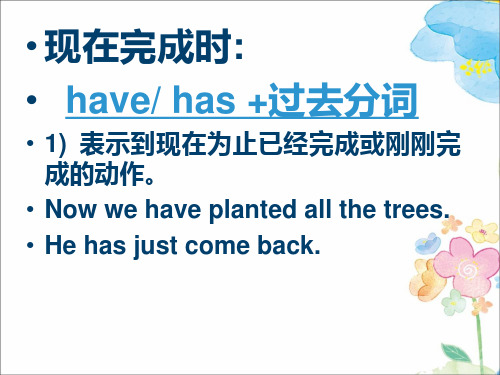
3. Mum’s cooked the dinner.
. Who has cooked the dinner?
4. Susan’s learned English at school.
Where has Susan learned English?
(for+表示一段时间的词组,since+表示过去某一时刻的词或词
动词填空:
1._H__a_v_e__ you __c_l_e_a_n_e_d____(clean) the room? Yes, we__h__a_v_e__d_o_n_e___(do) that already. When __d_id____ you __d_o___(do) it? We __d_id____(do) it an hour ago.
把下列句子改为一般疑问句
• I’ve already had dinner. Have you already had dinner?
2. He has just finished his homework. Has he just finished his homework?
3. Mum’s cooked the dinner. Has mum cooked the dinner?
常见的--begin, start, finish, go, come, leave, find, get up, arrive, reach, get to, enter, hear, stop, open, close, become, buy, borrow, lend, happen, join, lose, renew, die, take away, put up, set out, put on, get on/off等
- 1、下载文档前请自行甄别文档内容的完整性,平台不提供额外的编辑、内容补充、找答案等附加服务。
- 2、"仅部分预览"的文档,不可在线预览部分如存在完整性等问题,可反馈申请退款(可完整预览的文档不适用该条件!)。
- 3、如文档侵犯您的权益,请联系客服反馈,我们会尽快为您处理(人工客服工作时间:9:00-18:30)。
现在完成时专项练习一、写出下列动词的过去式和过去分词study _______ _______ eat _______ _______ pay _______ _______ chat_____ _______lose_______ ______ come _______ ________ read _______ _______ stop _______ _______run _______ _______fall _______ _______ see _______ _______ fell_______ _______ swim _______ _______ give _______ _______take _______ _______ write ____ _____ choose _______ _______get _______ _______ begin _______ _______be______ ______ bring _______ _______ catch _______ _______ find _______ _______ go _______ _______ hold _______ _______hear______ ______ lay ______ ______ hurt _____ ______ learn ______/ ______know _______/ ______ grow _____ ______ leave______/ ______have_______ /______ drive_____ ______ teach______/ ______make_______/ ______二、单项选择1、Both his parents look sad .Maybe they _________what's h appened to him .A. knew B.have known C.must know D.will know2、He has _______ been to Shanghai , has he ?A. already B.never C.ever D. still3、Have you met Mr Li ______?A.just B.ago C.before D. a moment ago4、The famous writer _____ one new book in the past two year s.A. is writing B.was writingC.wrote D.has written5、-Our country ______ a lot so far .-Yes . I hope it will be even ______ .A. has changed ; well B. changed ; goodC. has changed ; better D. changed ; better6、Zhao Lan ____already ____in this school for two years . A. was ; studying B. will ; studyC. has ; studied D. are ; studying7、We ______ Xiao Li since she was a little girl .A.know B.had known C.have known D. knew8、Harry Potter is a very nice film .I_______ it twice .A.will see B.have seen C.saw D.see9、-These farmers have been to the United States . -Really ? When _____ there ?A. will they go B. did they goC. do they go D. have they gone10、-______ you ___ your homework yet ?-Yes . I _____ it a moment ago .A.Did ; do ; finished B.Have ; done ; finishedC.Have ;done ;have finished D.will ; do ; finish11、His father ______ the Party since 1978 .A.joined B.has joined C.was in D.has been in12、-Do you know him well ?- Sure .We _______friends since ten years ago . A. were B.have been C.have become D. have made13、-How long have you ____ here ?-About two months .A. been B. gone C. come D. arrived14、Hurry up! The play _________for ten minutes .A.has begun B.had begun C.has been on D.began15、It ___ ten years since he left the army .A. is B. has C. will D. was16、Miss Green isn't in the office . she_______ to the libr ary .A.has gone B. went C.will go D. has been17、My parents ______ Shandong for ten years .A.have been in B. have been toC. have gone to D. have been18、The students have cleaned the classroom, ?A.so theyB.don't theyC. have theyD. haven't they19、Has Mr White been a memberof Greener Chinasincehe to China?A. How soon, comesB. How often, gotC. How long, cameD. How far, arrived20、His uncle for more than 9 years.A. has come hereB. has started to workC. has lived thereD. has left the university21. ( ) You'll answer for what you .A. will doB. have doneC. had doneD. do22. ( ) He Tokyo for two weeks.A. has leftB. has been away fromC. has been awayD. is leaving23. ( ) - have you been here? -For a month.A. How oftenB. How farC. How longD. How soon24. ( ) It's the third time you late for school this week.A. wereB. areC. had beenD. have been25. ( ) Many new railways down in the past few years.A. has been liedB. have been laidC. have been layedD. have been lied26. ( ) -Is that Jack speaking?-Sorry, he isn't in right now. He the cinema with hisaunt.A. has been toB. has gone toC. have been toD. have gone to27. ( ) It ten years since we last in Beijing.A. was, metB. had been, metC. was, meetD. is, meet三、用所给动词的适当形式填空1、We _____ just ______(talk) about you.2、Where are you _____(be)? I ____(be) to Nanjing.3、When ____ you ____(go) there ?I ______(there) there last month.4、______you _____(visit) the Great Wall yet?5、How long have you ______(teach) English in school?6、They _____(see) the film twice.7、He _____(work) in that hospital since he left college.8、I ____(be) to Shanghai for several time.9、What ____ you _______(do) yesterday? I ____(make) a cake.10、---_____you _____(be) to Beijing? ---yes, I have.11、Her parents _______(not write) to her since they left.12. I don’t know this woman. I (meet, never)her.13.-Let’s go to the cinema.-No, I (see, already)the film.14. We (finish, not)our homework yet. Will you wait a minute?15. John (come, not)yet. He will be back in a minute.16. Mr. Green often goes to America. In fact, he (be)there ten times.17. -Where’s John? -He just (go)to the teachers’ office.18. She (study)English since she was ten. She (begin)to study English when she was ten.19. Jim isn’t here. He(go)to the library. He (go)there an hour ago.20. He ________ (travel, never)on a train in her life.21. I (buy)the bike two weeks ago. I (have)this bike since the beginning of this month. I (have)it for two weeks.22. Great changes (take place)in those villages in the last ten years.23. How many times you (phone)me these days? _ you (phone)me this morning24. Tom can’t get into the room because he(lost)the key to the door.25. I (look)for the dictionary, but I (find not)it yet.26. -the new programmes (start)yet?-No, they (plan, still)27. you (know) where your sister has (go)?28. We (live)in Shanghai from 1989 to 1999. We (live)for 10 years.29. They can’t go with us. They (finish, not)the work yet.30. You (change, not )your mind, haven’t you?31.We must pay for the library book if we (lost)it.32、I (tell) you about the accident as soon as I (finish) the work.33.-I hear your father (be)to Japan once.-Yes. He (go)there last year.34. -When you (buy)the book?-I (have)it for two weeks.35. Such a thing (happen, never)in the village before.36. I think you never (hear) such a thing.37. you ( read) the book yet?38.Tom just (find) his cat.39.He (not see) the film yet.So he (see) it this evening.40.I (have) my lunch already.41. You (find) your lost book? Yes, I (find) it hours ago.42.You needn’t tell him about it. I already him about it.(tell)43.--when you there?(go) --Three weeks ago.44. --Jim, you (write) a letter to your aunt? --yes, I .I (write) it just now.45.Have you (return) the ladder yet? No, not .I (return) it soon.46.So far, I (not get) a letter from him.47.Until now, she already (write) three books.48.In the past few years, we (build) a lot of buildings. 49.This is the first time I (visit) the Great Wall.50.We already (know) each other before.51.We (get) to know each other three years ago.52.—How many times you ever to Shanghai? --I ever there three times.(去过)53.-Where is Jim?--He to the teachers’ office(去了)54. -- you to the hospital yet?(去过)--yes, I (go)to see Doctor Li this morning and he (give)me some medicine.-- you (take) it.?-- Yes, I it just a moment ago. (take)55. It (rain)for a week.57. He _____ (live) here since he ____ (move) here. 58.Our Maths teacher ____ (talk) to a boy when I ____ (enter) the room59.The Greens ____________ (be) to the Great Wall twice.60.I ______ (give) the message to her as soon as he _________ (come) back.61.There ______ (be) no books on the shelf a moment ago. 62.Look, the Greens _____ (have) supper. But we ____ just __ ___ (eat) it.63.In one or two years, she (become) a doctor.四、句型转换(每空一词)1、Miss Zhang has traveled to Beijing.(改为否定句)Miss Zhang________ ________ to Beijing.2、Have you ever wanted to visit the Summer Palace?(作肯定回答)_______, I ______.3、He has answered all the questions.(对划线部分提问)__ _____ ________ he _______?4、He has found something in the room.(改为一般疑问句)_______ he found ________ in the room?5、I didn't see him last year.(改为现在完成时)I ______ _____ him for a long time.6、The old man dide last year.(同义句改写)He _____ ______ for a year.7、This factory opened twenty years ago.(改写句子,句意不变)This factory _____ _______ for twenty years.8、Miss Gao left an hour ago.(改写句子,句意不变)Miss Gao _____ ______ _______ ______an hour ago.9、The Green Family moved to France two years ago.(改写句子,句意不变)______ two years ______ the Green Family moved toFrance.10、The bus has arrived here. It arrived ten minutes ago (改写句子,句意不变)11、They have known each other for 6 years (改写句子,句意不变)They have known each other______6 years______12、I b ought the bike last yearI___________the bike for_______ _______13、David has already got something to eat (改为否定句)Da vid_______ _______ _______to eat__________.14. He died two years ago.(改为同义句)He ___ ____ ____ for two years.15. I bought the pen three hours ago.(改为同义句)I ____ ____the pen for three hours.16.I joined the army three years ago. (改为同义句)I a member of the army three years.===I the army for three years.===It three years he the army.17. She has worked in the school for three years. (改为同义句)She has the school three years .18. I borrowed the book three days ago. (同义句)I the book for three days19. She (learn) English for three years.She ______ _____ (learn) English ______ three years ____ .(用since)20、The old man _________ last year.He for a year. (die) (动词填空)21、This factory opened twenty years ago.(同义句转换)This factory _______for twenty years.22、Miss Gao left an hour ago. (同义句转换)Miss Gao ______ ______ _______ _______ an hour ago.23、Her mother has been a Party member for three y ears .(同义句)Her mother _____the Party three years________ .24、The Green Family moved to France two years ago. (同义句转换)____two years ____the Green family moved to France.25、The bus has arrived here. It arrived ten minutes ago. (把两个句子合并成一个句子)___________________________________________26. He has already finished his homework.(改为否定句)He finished his homework .。
